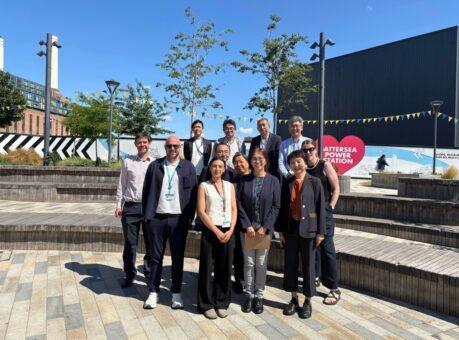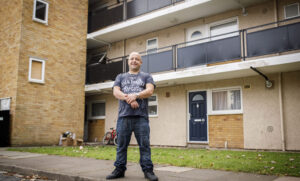What a Japanese perspective showed me about British housing

Dot Dot Dot’s founder, Katharine Hibbert, recently hosted a group of housing professionals from Japan. Her latest article reflects on what it was like to tour different UK housing projects through new eyes.
Like most people working in housing in the UK, I usually focus on everything that’s going wrong. The challenges are real, and it’s our job to address them. But it’s easy to get so demoralised by the problems that we miss the successes that are in front of us.
That’s why it was so uplifting to host a group of Japanese academics, architects and civil servants on a recent week-long visit to see what they could learn from British approaches to placemaking and community building.
Our tour took us to projects in Sheffield, Manchester and London to see estate regeneration projects delivered by Peabody, Poplar HARCA and Urban Splash. We visited Investec – a bank in the Square Mile which funds social enterprises. And we visited Manchester Community Central, which supports grassroots projects and holds an annual award ceremony for local heroes.
It was fascinating to see these projects from an outside perspective. The group was impressed by the gardens, community spaces and co-working areas provided within the projects we visited. At Peabody’s Burridge Gardens regeneration, we overheard a group of residents enjoying their weekly bingo morning in a beautiful, architecturally interesting community centre, and on Poplar HARCA’s Aberfeldy Estate we saw huge murals co-designed with residents.
From a British perspective, these are good examples of types of projects that we’re familiar with. But this focus on areas outside people’s homes, and on empowering residents to design things the way they want them, is less common in Japanese property development – and was a large part of what the visitors wanted to see and feel, in order to take their learnings home. For me, it was good to be reminded of just how much difference these approaches and shared spaces can make.
The visit to Investec was equally interesting, since the Japanese visitors had arrived determined to find tips for persuading banks back home of the benefits of investing in social enterprises. Here in the UK, we often take it for granted that corporate social responsibility boosts customer engagement and employee loyalty. This is a less conventional view among banks in Japan, so it will be exciting to see how the group takes this conversation forward.
Finally, we’re used to the idea of celebrating individuals who go out of their way to volunteer or to contribute to their community in other ways from Knighthoods and OBEs all the way to local awards like the ‘Spirit of Manchester’ prizes run by Manchester Community Central, it’s a normal concept. Not so in Japan – volunteering is less common than it is here, as are prizes and awards that celebrate it. Of course, how to celebrate contribution needs to be culturally appropriate – but one of the guests is already designing a plan to launch a ‘Spirit of Tokyo’ awards, inspired by what we saw in Manchester.
It is easy, of course, to pick holes in all of these themes – the new social housing that is built may be lovely, but there isn’t enough of it. Corporate sponsorship can sometimes be a form of greenwashing. And perhaps it’s more principled to reject an award, like David Bowie or Benjamin Zephaniah. But my week with the Japanese guests was an important reminder: we can’t let our efforts to improve the bad blind us to what is working. Now and then, it’s worth taking a moment to celebrate our placemaking and community-building successes – perhaps even without hosting guests who’ve travelled 6,000 miles to learn from us.


